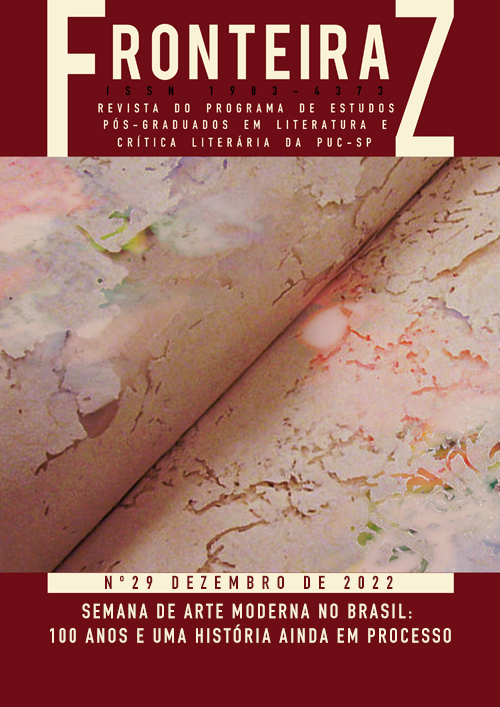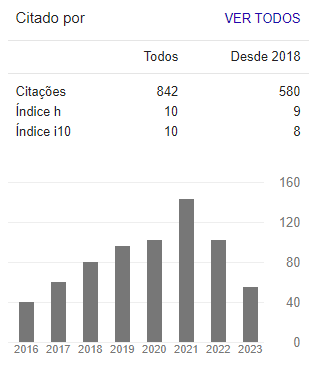The close bond between ogbanje daughters and their fathers in the novels Things Fall Apart and The Bride Price
DOI:
https://doi.org/10.23925/1983-4373.2022i29p143-156Palabras clave:
Ogbanje, Igbo culture, Nigerian novels, Chinua Achebe, Buchi EmechetaResumen
Nigeria comprises over 200 ethnic groups, making it the most multi- ethnic nation in West Africa. As part of both the Igbo and the Yòrubá cultures, ogbanje/abiku are children who are born to die and then return to be reborn by the same mother. This phenomenal cycle has been narrated in Chinua Achebe’s Things Fall Apart (1958) and Buchi Emecheta’s The Bride Price (1976). Based on Achebe (1986) and other scholars, this paper analyzes the ogbanje phenomenon and draws a parallel between both novels, bringing to light the close bond between ogbanje daughters and their fathers. As a result, the paper points out a connection by unveiling a shared attribute of ‘manliness’ between Okonkwo and his daughter with a focus on the neglect of local traditions. The comparative analysis is intended as a pilot study of a broader investigation of culture in the fields of literary and cultural studies.
Citas
ACHEBE, C. The African Trilogy: Things Fall Apart; Arrow of God; No Longer at Ease. New York: Penguin Classics, 2017.
ACHEBE, C. The world of the Ogbanje. Enugu: Fourth Dimension Publishers, 1986.
ACHEBE, N. Igbo Goddesses and the Priests and Male Priestesses Who Serve Them. In: FALOLA, T.; NJOKU, R. C. (Ed.). Igbo in the Atlantic world: African origins and diasporic destinations. Bloomington: Indiana University Press, 2016, p. 28-45.
AJI, A.; ELLSWORTH, K. L. Ezinma: The Ogbanje Child in Achebe’s Things Fall Apart. College Literature, v. 19/20, n. 3/1, p. 170-175, 1992. Disponível em: http://www.jstor.org/stable/25111997. Acesso em: 15 maio 2022.
ASAKITIKPI, A. E. Born to Die: The Ogbanje Phenomenon and Its Implication on Childhood Mortality in Southern Nigeria. Anthropologist, v. 10, n. 1, p. 59-63, 2008. Disponível em: https://doi.org/10.1080/09720073.2008.11891030. Acesso em: 20 abr. 2022.
CASTORIADIS, C. Translated by Kathleen Blarney. The Imaginary Institution of Society. Cambridge: Polity, 1987.
COOPER, B. Magical Realism in West African Fiction: Seeing with a third eye. London: Routledge, 1998.
EBHOMIENLEN, T. O. The Concepts of Born to Die Children and the Fate of Victim Mothers in Nigeria. International Journal of Humanities and Cultural Studies, v. 2, n. 1, p. 142-155, June 2015. Disponível em: http://www.ijhcs.com/index.php/ijhcs/article/view/302. Acesso em: 22 abr. 2022.
EDEH, E. M. P. Towards an Igbo Metaphysics. Chicago: Loyola University Press, 1985.
EMECHETA, B. The Bride Price. New York: George Braziller, 2014.
FALOLA, T. The Power of African Cultures. New York: University of Rochester Press, 2003.
FALOLA, T.; HEATON, M. M. A History of Nigeria. New York: Cambridge University Press, 2008.
HARLER, C. A. The Ogbanje in Little Bee by Chris Cleave. 2013. Dissertation (Master of Arts in English Literature) – College of Arts, Humanities & Social Sciences, Eastern Washington University, Cheney, 2013. Disponível em: http://dc.ewu.edu/theses/175. Acesso em: 15 abr. 2022.
ILECHUKWU, S. T. C. Ogbanje/abiku and cultural conceptualizations of psychopathology in Nigeria. Mental Health, Religion & Culture, v. 10, n. 3, p. 239-255, 2007. Disponível em: https://doi.org/10.1080/13694670600621795. Acesso em: 20 abr. 2022.
KATUNDANO, T. Cultural Practices in Africa: Still a Barrier to Girls’ Education in the 21st Century? International Journal of Educational Theory and Practice, v. 3, n. 1/4, p. 1-17, 2020. Disponível em: https://finessejournals.com/index.php/IJETP/article/view/23/20. Acesso em: 10 jul. 2022.
LYNCH, P. A. African mythology A to Z. New York: Chelsea House, 2010.
MBAH, G. A.; UZODIGWE, H. A. Onyohor Community. In: EZIKE, S. (Ed.). History and Tradition of the People of Igbo-Etiti. Ibadan: The Society of Young Nigerian Writers, 2009. p. 209-225.
NWAUBANI, A. T. Nigeria's slave descendants prevented from marrying who they want. BBC News, Nigeria/London, 14 set. 2020. Africa. Disponível em: https://www.bbc.com/news/world-africa-54088880. Acesso em: 01 jul. 2022.
NZEWI, E. Malevolent Ogbanje: recurrent reincarnation or sickle cell disease? Social Science & Medicine, v. 52, n. 9, p. 1403-1416, 2001. Disponível em: https://doi.org/10.1016/S0277-9536(00)00245-8. Acesso em: 22 abr. 2022.
OGUNBOYE, A. O. P.; FULLER, L. L. The human soul in Yoruba/Igbo tradition and the Bible. Africa Journal of Evangelical Theology, v. 19, n. 1, p. 75-86, 2000. Disponível em: https://biblicalstudies.org.uk/pdf/ajet/19-1_075.pdf. Acesso em: 20 abr. 2022.
OKONKWO, C. N. A Critical Divination: Reading Sula as Ogbanje-Abiku. African American Review, v. 38, n. 4, p. 651-668, Winter 2004. Disponível em: https://doi.org/10.2307/4134423. Acesso em: 22 maio 2022.
SENANU, K. E.; VINCENT, T. A Selection of African Poetry. London: Longman, 1988.
SOYINKA, W. Myth, Literature and the African World. Cambridge: Cambridge University Press, 2000.
Descargas
Publicado
Cómo citar
Número
Sección
Licencia
Derechos de autor 2022 FronteiraZ. Revista del Programa de Estudios Posgrado en Literatura y Crítica Literaria

Esta obra está bajo una licencia internacional Creative Commons Atribución-NoComercial 4.0.







 Este obra está licenciada com uma Licença
Este obra está licenciada com uma Licença 